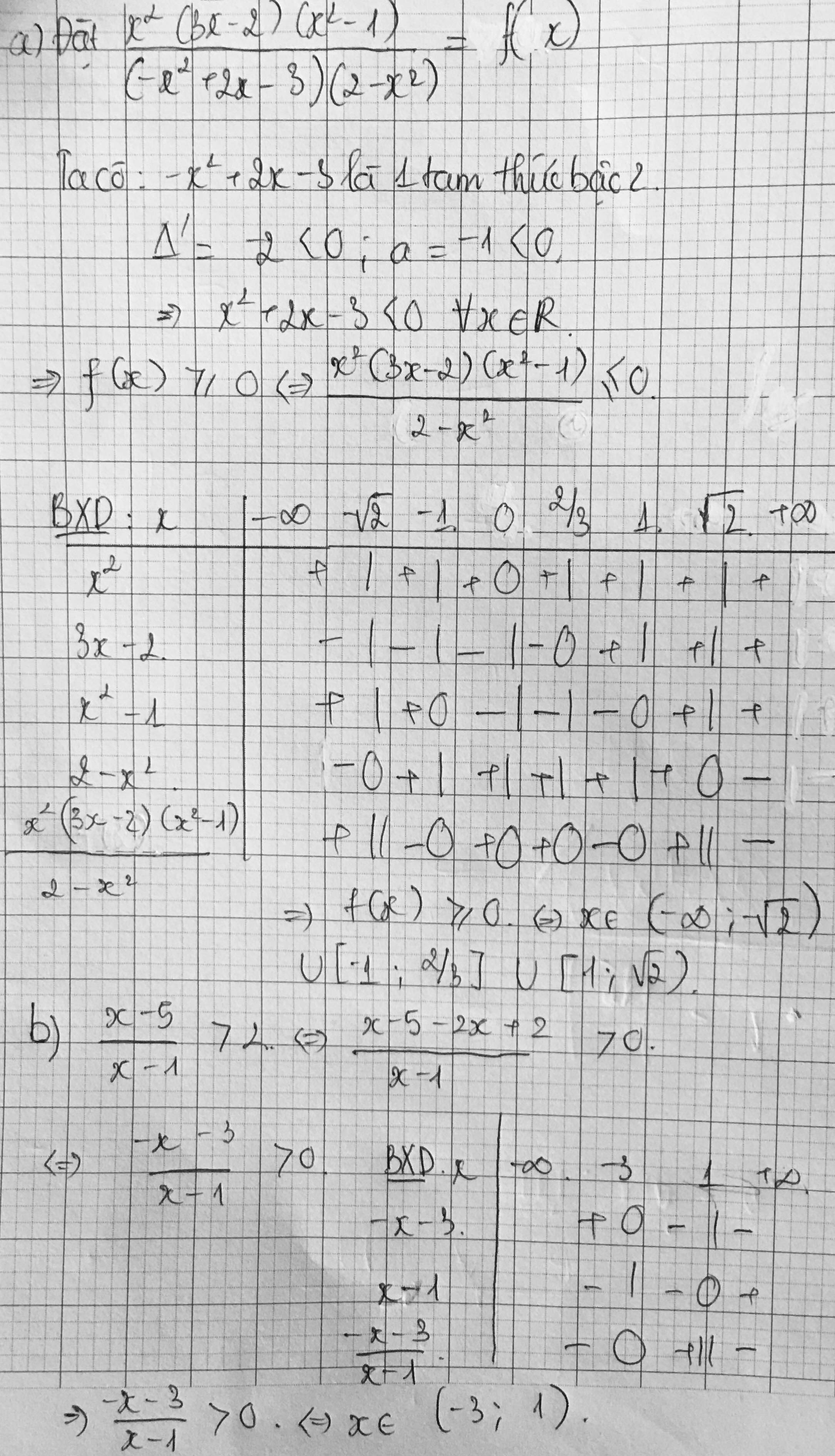Giải bất phương trình: \(\left(x+1\right)\left(4-x\right)< 5\sqrt{x^2+5x+28}\)
Hãy nhập câu hỏi của bạn vào đây, nếu là tài khoản VIP, bạn sẽ được ưu tiên trả lời.


a, ĐKXĐ : \(D=R\)
BPT \(\Leftrightarrow x^2+5x+4< 5\sqrt{x^2+5x+4+24}\)
Đặt \(x^2+5x+4=a\left(a\ge-\dfrac{9}{4}\right)\)
BPTTT : \(5\sqrt{a+24}>a\)
\(\Leftrightarrow\left[{}\begin{matrix}\left\{{}\begin{matrix}a+24\ge0\\a< 0\end{matrix}\right.\\\left\{{}\begin{matrix}a\ge0\\25\left(a+24\right)>a^2\end{matrix}\right.\end{matrix}\right.\)
\(\Leftrightarrow\left[{}\begin{matrix}-24\le a< 0\\\left\{{}\begin{matrix}a^2-25a-600< 0\\a\ge0\end{matrix}\right.\end{matrix}\right.\)
\(\Leftrightarrow\left[{}\begin{matrix}-24\le a< 0\\0\le a< 40\end{matrix}\right.\)
\(\Leftrightarrow-24\le a< 40\)
- Thay lại a vào ta được : \(\left\{{}\begin{matrix}x^2+5x-36< 0\\x^2+5x+28\ge0\end{matrix}\right.\)
\(\Leftrightarrow-9< x< 4\)
Vậy ....
b, ĐKXĐ : \(x>0\)
BĐT \(\Leftrightarrow2\left(\sqrt{x}+\dfrac{1}{2\sqrt{x}}\right)< x+\dfrac{1}{4x}+1\)
- Đặt \(\sqrt{x}+\dfrac{1}{2\sqrt{x}}=a\left(a\ge\sqrt{2}\right)\)
\(\Leftrightarrow a^2=x+\dfrac{1}{4x}+1\)
BPTTT : \(2a\le a^2\)
\(\Leftrightarrow\left[{}\begin{matrix}a\le0\\a\ge2\end{matrix}\right.\)
\(\Leftrightarrow a\ge2\)
\(\Leftrightarrow a^2\ge4\)
- Thay a vào lại BPT ta được : \(x+\dfrac{1}{4x}-3\ge0\)
\(\Leftrightarrow4x^2-12x+1\ge0\)
\(\Leftrightarrow x=(0;\dfrac{3-2\sqrt{2}}{2}]\cup[\dfrac{3+2\sqrt{2}}{2};+\infty)\)
Vậy ...

b: Đặt \(x^2+5x+4=a\)
\(\Leftrightarrow a=5\sqrt{a+24}\)
\(\Leftrightarrow a^2=25a+600\)
\(\Leftrightarrow a^2-25a-600=0\)
\(\Leftrightarrow\left(a-40\right)\left(a+15\right)=0\)
\(\Leftrightarrow a=-15\)
hay S=∅

Đặt :
\(t=\sqrt{x^2-5x+5}\left(t\ge0\right)\)
Bất phương trình trở thành :
\(\log_2\left(t+1\right)+\log_3\left(t^2+2\right)\le2\)
Xét \(f\left(t\right)=\log_2\left(t+1\right)+\log_3\left(t^2+2\right)\) trên \(\left(0;+\infty\right)\)
Do \(t\ge0\) nên \(\log_2\left(t+1\right)\) và \(\log_3\left(t^2+2\right)\) đều là các hàm số đồng biến, do đó f(t) đồng biến trên \(\left(0;+\infty\right)\)
Lại có f(1)=2, từ đó suy ra \(t\le1\)Giải ra được :\(1\le x\)\(\le\frac{5-\sqrt{5}}{2}\) hoặc \(\frac{5-\sqrt{5}}{2}\le x\) \(\le4\)
\(a,4\left(x-3\right)^2-\left(2x-1\right)^2\ge12\)
\(\Leftrightarrow4x^2-24x+36-4x^2-4x+1\ge12\)
\(\Leftrightarrow-28x+37\ge12\)
\(\Leftrightarrow-28x\ge12-37\)
\(\Leftrightarrow-28x\ge-25\)
\(\Leftrightarrow x\le\dfrac{25}{28}\)
Vậy \(S=\left\{x\left|x\le\dfrac{25}{28}\right|\right\}\)
b, \(\left(x-4\right)\left(x+4\right)\ge\left(x+3\right)^2+5\)
\(\Leftrightarrow x^2-16\ge x^2+6x+9+5\)
\(\Leftrightarrow x^2-x^2-6x\ge9+5+16\)
\(\Leftrightarrow-6x\ge30\)
\(\Leftrightarrow x\le-5\)
Vậy \(S=\left\{x\left|x\le-5\right|\right\}\)
\(c,\left(3x-1\right)^2-9\left(x+2\right)\left(x-2\right)< 5x\)
\(\Leftrightarrow9x^2-6x-1-9x^2+36< 5x\)
\(\Leftrightarrow9x^2-9x^2-6x-5x+36+1< 0\)
\(\Leftrightarrow-11x+37< 0\)
\(\Leftrightarrow-11x< -37\)
\(\Leftrightarrow x>\dfrac{37}{11}\)
vậy \(S=\left\{x\left|x>\dfrac{37}{11}\right|\right\}\)

Hãy tích cho tui đi
vì câu này dễ mặc dù tui ko biết làm
Yên tâm khi bạn tích cho tui
Tui sẽ ko tích lại bạn đâu
THANKS
( x +1 ) ( x + 4 ) = 5 căn ( x^2 + 5x +28 ) (1)
= ( x + 1 ) ( x + 4 ) = 5 căn [ (x^2 + 5x + 4) + 24 ]
= ( x + 1 ) ( x + 4 ) = 5 căn [ ( x + 1 ) ( x + 4 ) + 24 ]
Đặt a = ( x + 1 ) ( x + 4 )
(1) <=> a = 5 căn ( a + 24 )
<=> a^2 = 25 ( a + 24 )
<=> a^2 - 25a - 600 = 0
<=> a1 = 40
a2 = -15
với a = 40 ta có:
( x + 1 ) ( x + 4 ) = 40
<=> x^2 + 5x + 4 = 40
<=> x^2 + 5x - 36 = 0
<=> x = 4 và x = - 9
với a = -15, ta có:
( x + 1 ) ( x + 4 ) = -15
<=> x^2 + 5x + 4 = -15
<=> x^2 + 5x + 19 = 0
delta < 0 => pt vô nghiệm
Vậy s = { -9; 4}

Câu 4:
Giả sử điều cần chứng minh là đúng
\(\Rightarrow x=y\), thay vào điều kiện ở đề bài, ta được:
\(\sqrt{x+2014}+\sqrt{2015-x}-\sqrt{2014-x}=\sqrt{x+2014}+\sqrt{2015-x}-\sqrt{2014-x}\) (luôn đúng)
Vậy điều cần chứng minh là đúng
2) \(\sqrt{x^2-5x+4}+2\sqrt{x+5}=2\sqrt{x-4}+\sqrt{x^2+4x-5}\)
⇔ \(\sqrt{\left(x-4\right)\left(x-1\right)}-2\sqrt{x-4}+2\sqrt{x+5}-\sqrt{\left(x+5\right)\left(x-1\right)}=0\)
⇔ \(\sqrt{x-4}.\left(\sqrt{x-1}-2\right)-\sqrt{x+5}\left(\sqrt{x-1}-2\right)=0\)
⇔ \(\left(\sqrt{x-4}-\sqrt{x+5}\right)\left(\sqrt{x-1}-2\right)=0\)
⇔ \(\left[{}\begin{matrix}\sqrt{x-4}-\sqrt{x+5}=0\\\sqrt{x-1}-2=0\end{matrix}\right.\)
⇔ \(\left[{}\begin{matrix}\sqrt{x-4}=\sqrt{x+5}\\\sqrt{x-1}=2\end{matrix}\right.\)
⇔ \(\left[{}\begin{matrix}x\in\varnothing\\x=5\end{matrix}\right.\)
⇔ x = 5
Vậy S = {5}

Có lẽ đây là 1 đề bài ko chính xác
- Với \(\left[{}\begin{matrix}x\le-1\\x\ge4\end{matrix}\right.\) \(\Rightarrow\left\{{}\begin{matrix}VP>0\\VT\le0\end{matrix}\right.\) BPT luôn đúng
- Với \(-1< x< 4\)
\(VT\le\dfrac{1}{4}\left(x+1+4-x\right)^2=\dfrac{25}{4}\)
\(VP=5\sqrt{\left(x+\dfrac{5}{2}\right)^2+\dfrac{87}{4}}\ge5.\sqrt{\dfrac{87}{4}}>\dfrac{25}{4}>VT\)
Vậy BPT luôn đúng hay tập nghiệm của BPT đã cho là R